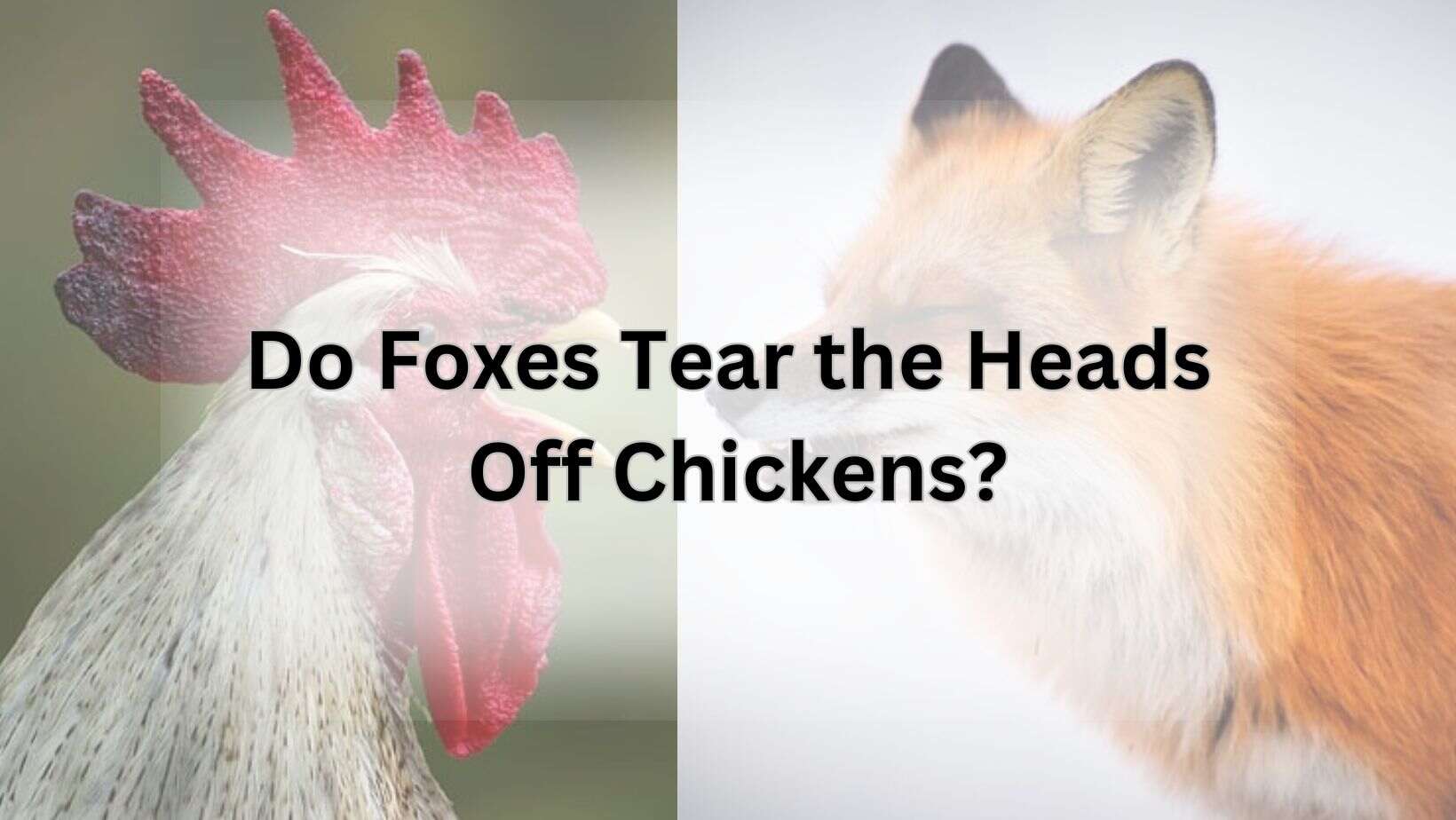Do Foxes Really Rip Chickens’ Heads Off? Find Out Here!

Do Foxes Rip Chickens Heads Off
Yes, foxes are known to rip the heads off chickens in some instances. This behavior is a result of the predatory nature of foxes, who see chickens as easy prey due to their smaller size and lack of defense mechanisms.
Anatomy of Foxes and Chickens
Have you ever wondered why foxes target chickens specifically? Well, foxes have sharp teeth and claws that allow them to efficiently hunt and kill small animals like chickens. On the other hand, chickens are not equipped with strong defense mechanisms, making them vulnerable to attacks from predators like foxes.
Instances of Foxes Ripping Chicken Heads Off
Imagine waking up to find your chicken coop in disarray, with headless chickens scattered around. Unfortunately, this is a common sight for many farmers who have to deal with fox attacks on their poultry. Foxes are known to kill chickens by biting their necks and decapitating them, often leaving a gory scene behind.
Prevention Methods to Avoid Head Injuries
How can you protect your precious chickens from falling victim to a fox attack? One effective method is to secure your chicken coop with sturdy fencing and locks to prevent foxes from gaining access. Additionally, installing motion-activated lights or sound devices can deter foxes from approaching your coop. Remember, prevention is key when it comes to keeping your chickens safe from predators like foxes.
So, if you want to ensure the safety of your feathered friends, be proactive in implementing preventive measures to avoid the gruesome sight of foxes ripping chicken heads off in your backyard.
Understanding Fox Behavior Towards Chickens
Why do foxes rip chickens’ heads off? Let’s dive into the fascinating world of predator-prey relationships between foxes and chickens.
Hunting Techniques of Foxes
Foxes are cunning carnivores known for their stealthy hunting techniques. When it comes to chickens, these crafty creatures often target the head as it’s the quickest way to incapacitate their prey. By going for the head, foxes can swiftly take down a chicken before it has a chance to escape.
Factors That Trigger Fox Attacks
What triggers a fox to attack a chicken coop? Foxes are opportunistic predators, and factors such as hunger, easy access to a chicken coop, and the presence of vulnerable chickens can trigger their attacks. It’s important to understand these factors to better protect your feathered friends.
Patterns of Fox Predation on Chickens
Have you noticed any patterns in fox predation on chickens? Foxes often strike at night when chickens are roosting and more vulnerable. They may also return to the scene of a successful hunt, so keep an eye out for any signs of repeated attacks. Understanding these patterns can help you take proactive measures to safeguard your chickens.
As a seasoned Canid Wildlife Lover, you know that protecting your chickens from fox attacks requires a combination of strategies. From securing your coop with sturdy fencing to using natural deterrents like motion-activated lights or predator urine, there are various ways to keep foxes at bay. Remember, a well-protected chicken coop is a happy chicken coop!
So, the next time you hear a fox’s eerie call in the night, rest assured that you’re equipped with the knowledge to outsmart these wily predators and keep your chickens safe. Happy farming, and may your coop always be fox-free!
The Impact of Fox Attacks on Chicken Populations
Why do foxes target chickens’ heads?
Ever wondered why foxes have a particular affinity for chicken heads? It’s not just a gruesome habit – foxes go straight for the head because it’s the quickest way to kill their prey.
Fox attacks on chickens can have devastating consequences for both chicken farmers and the birds themselves. Let’s dive into the various aspects of how these attacks affect chicken populations.
Economic Losses for Chicken Farmers
How much damage can a cunning fox do to a chicken farmer’s livelihood? The answer – a lot! When foxes decimate chicken populations, farmers not only lose valuable birds but also face financial setbacks due to decreased egg production and potential damage to infrastructure.
Psychological Stress on Chicken Owners
Imagine waking up to find your beloved chickens with their heads ripped off by a sneaky fox. The emotional toll on chicken owners can be immense, causing stress and anxiety. It’s not just about the financial loss but also the heartbreak of losing cherished pets.
Measures to Protect Chickens from Foxes
How can chicken owners keep their feathered friends safe from these cunning predators? Installing secure fencing, using motion-activated lights or alarms, and keeping chickens locked up at night are effective ways to deter foxes. Additionally, employing guard dogs or even setting up live traps can help protect chickens from fox attacks.
Remember, foxes are intelligent creatures, so it’s essential to stay one step ahead of them when safeguarding your chicken coop. By implementing these protective measures, you can minimize the risk of fox attacks and ensure your chickens remain safe and sound.
4. Why Do Foxes Attack Chickens?
4.1 Natural Predatory Instincts
Ever wondered why foxes have a reputation for being chicken predators? Well, let’s dive into their natural predatory instincts. Foxes are skilled hunters, and chickens make for an easy and delicious meal for them. These cunning creatures have evolved over time to be efficient predators, and unfortunately, chickens fall right into their line of sight.
4.2 Lack of Alternative Food Sources
So, what drives a fox to target your precious chickens? One reason could be the lack of alternative food sources. In the wild, foxes have to hunt for their meals, and when they come across a chicken coop, it’s like hitting the jackpot for them. Chickens are a convenient and tasty option for foxes when their usual prey is scarce.
4.3 Easy Prey in Domestic Settings
Now, let’s talk about why foxes target chickens specifically in domestic settings. Picture this: a cozy chicken coop filled with plump, unsuspecting chickens just waiting to be snatched up by a hungry fox. It’s like a fast-food drive-thru for these crafty predators. The lack of natural defenses in domestic chickens, combined with the easy access to them, makes them a prime target for foxes looking for a quick and easy meal.
So, next time you spot a fox lurking around your chicken coop, remember that it’s not personal – it’s just nature taking its course. Keep your chickens safe and secure, and maybe consider installing some extra precautions to deter those sly foxes from turning your coop into their next buffet. Stay vigilant, and outsmart those foxes before they have a chance to strike!
5. How to Deter Foxes from Attacking Chickens
Why are Foxes a Threat to Chickens?
Ever wondered why foxes have a penchant for decapitating chickens? Well, let’s dive into the world of predator-prey relationships and animal behavior to understand their motives.
Foxes, being carnivorous animals, view chickens as easy prey due to their size and vulnerability. When a fox attacks a chicken coop, it often goes for the kill by ripping off the chicken’s head. This behavior stems from their instinct to hunt efficiently and consume their prey quickly.
Installing Secure Chicken Coops
How can you ensure your chickens are safe from these sly farmyard predators? Let’s talk about the first line of defense – secure chicken coops.
One effective way to deter foxes from attacking chickens is by installing sturdy and predator-proof chicken coops. Make sure the coop is equipped with strong wire mesh, secure locks, and buried fencing to prevent foxes from gaining access to your feathered friends.
Using Motion-Activated Lights or Alarms
Are there any high-tech solutions to keep foxes at bay and protect your chickens from becoming a fox’s next meal? Let’s shed some light on this innovative approach.
Consider installing motion-activated lights or alarms around your chicken coop to deter foxes. These devices can startle and scare off potential predators, keeping your chickens safe and sound. After all, foxes might be cunning, but they don’t like surprises!
Implementing Natural Repellents in the Area
Is there a more natural way to ward off foxes without relying on technology? Let’s explore the power of natural repellents in keeping your chickens out of harm’s way.
You can plant strong-smelling herbs like lavender, mint, or rosemary around your chicken coop to repel foxes. These scents are known to deter predators and create a barrier that foxes would rather avoid. Plus, your coop will smell like a fragrant garden – a win-win for both you and your chickens!
6. The Role of Human Intervention in Fox-Chicken Conflicts
Why do foxes target chickens?
Ah, the age-old battle between the cunning fox and the unsuspecting chicken. Foxes are natural predators, and unfortunately for our feathered friends, chickens make for a tasty meal in the eyes of these sly creatures. But fear not, dear reader, for there are ways to navigate this predator-prey relationship.
Legal Implications of Trapping or Killing Foxes
So, you’ve got a fox problem on your hands. While it may be tempting to take matters into your own hands and rid your property of these chicken-snatching bandits, it’s important to consider the legal implications. In many places, trapping or killing foxes may require permits or adherence to specific regulations. Remember, we want to protect our chickens, but we must also respect the laws of the land.
Ethical Considerations in Wildlife Management
Now, let’s talk ethics. As animal lovers and wildlife enthusiasts, it’s crucial to approach wildlife management with a compassionate heart. While we want to protect our chickens, we must also consider the impact of our actions on the delicate balance of nature. Finding humane ways to deter foxes from attacking chickens is key to maintaining harmony in the ecosystem.
Finding a Balance Between Conservation and Protection
Ah, the age-old dilemma – conservation versus protection. As lovers of wildlife, we strive to find a balance between conserving the natural habitat of foxes and protecting our beloved chickens. It’s a delicate dance, but with a bit of creativity and resourcefulness, we can create solutions that benefit both the predators and the prey.
Remember, dear reader, in the grand scheme of things, we are all just trying to survive in this wild world. So, let’s approach the fox-chicken conflict with a blend of pragmatism, compassion, and a touch of humor. After all, life is too short to cry over spilled chicken feed. Let’s outfox the foxes and keep our chickens clucking happily ever after!
7. Common Misconceptions About Fox Behavior
Foxes as Malicious Predators
Do foxes really rip chickens’ heads off out of malice? Let’s debunk this common myth. Foxes are not malicious creatures; they are simply following their natural instincts as carnivorous animals. When a fox attacks a chicken, it is for survival, not for pleasure. Foxes need to hunt for food, and unfortunately, chickens make for an easy and tasty meal for them.
Foxes Attacking for Fun or Sport
Are foxes attacking chickens just for fun or sport? Absolutely not! Foxes do not engage in activities for entertainment like humans do. Their actions are solely driven by their instincts and the need to feed themselves and their young. So, the next time you see a fox near your chicken coop, remember that it’s not there to play a game of chicken head ripping, but to satisfy its hunger.
Educating the Public on Fox Ecology
How can we educate the public on fox ecology to dispel these misconceptions? It’s essential to spread awareness about the behavior of foxes and their role in the ecosystem. Foxes play a crucial part in controlling rodent populations and maintaining a balanced ecosystem. By understanding their natural behavior, people can learn to coexist peacefully with these beautiful creatures without demonizing them for being predators.
So, the next time you hear someone blaming a fox for ripping off a chicken’s head, remind them that it’s just nature taking its course. Foxes are not villains; they are simply trying to survive in a world where they must hunt for their food. By educating ourselves and others about fox ecology, we can foster a deeper appreciation for these fascinating animals and their important role in the natural world.
8. Case Studies of Fox-Chicken Encounters
8.1 Documented Accounts of Fox Attacks
Have you ever wondered how foxes manage to catch and kill chickens with such precision? Well, let’s dive into some documented accounts of fox attacks on unsuspecting chicken coops. Foxes are cunning predators known for their stealth and agility, making them formidable foes for any chicken owner.
8.2 Lessons Learned from Past Incidents
What can we learn from past incidents of fox attacks on chickens? Understanding the behavior and patterns of these predators is crucial in protecting your flock. Let’s explore some valuable lessons that can help you safeguard your chickens from these sly creatures.
8.3 Strategies for Coexisting with Foxes Safely
How can you peacefully coexist with foxes while keeping your chickens safe? From building secure coops to using natural deterrents, there are various strategies you can employ to protect your feathered friends from fox attacks. Let’s uncover some practical tips for living harmoniously with these wild canids.
The Importance of Responsible Pet Ownership
Securing Pets in Fox-Prone Areas
Ever wondered why foxes have a reputation for being chicken predators? Well, let me tell you – these cunning creatures have a knack for sneaking into chicken coops and causing chaos. So, if you want to keep your feathered friends safe, it’s crucial to secure your pets in fox-prone areas. Remember, a lock on the coop door can go a long way in preventing those sly foxes from turning your chickens into a midnight snack!
Supervising Outdoor Activities for Pets
Are you worried about your pets falling victim to a fox attack while frolicking outdoors? Don’t fret! By supervising their outdoor activities, you can significantly reduce the risk of a fox encounter. Keep a close eye on your furry friends and make sure they don’t wander too far from home. After all, prevention is better than a fox-induced chicken disaster!
Training Pets to Avoid Potential Predators
Do you want to teach your pets how to fend off potential predators like foxes? Well, it’s time to get them into predator-avoidance training! By teaching your pets to be alert and cautious around possible threats, you can help them stay safe from harm. Remember, a little training goes a long way in keeping your beloved pets out of harm’s way.
As a seasoned Canid Wild Life Lover, I’ve seen my fair share of fox-chicken encounters. Trust me, responsible pet ownership is the key to ensuring the safety of your beloved animals. So, take the necessary precautions, keep a watchful eye on your pets, and train them to avoid potential predators. By doing so, you can create a harmonious environment where both your pets and the local wildlife can coexist peacefully.
Seeking Professional Help for Fox Management
Why is it important to consult wildlife experts for advice?
Ever wondered why those sly foxes keep targeting your precious chickens? Let’s dive into why seeking advice from wildlife experts is crucial in managing these cunning creatures.
How can hiring pest control services help in fox removal?
Are those pesky foxes causing chaos in your chicken coop? Discover how pest control services can come to the rescue and help you bid farewell to these chicken-head-ripping culprits.
What role do local authorities play in wildlife protection initiatives?
Are you tired of dealing with fox attacks on your chickens? Learn how collaborating with local authorities can lead to effective wildlife protection initiatives that benefit both your feathered friends and the wily foxes.
As a seasoned Canid Wild Life Lover, I have seen my fair share of fox-chicken encounters over the past 20 years. Let me share some insights and tips on how to tackle these cunning creatures and protect your beloved chickens. Let’s dive in!






